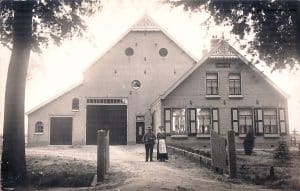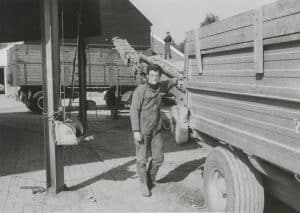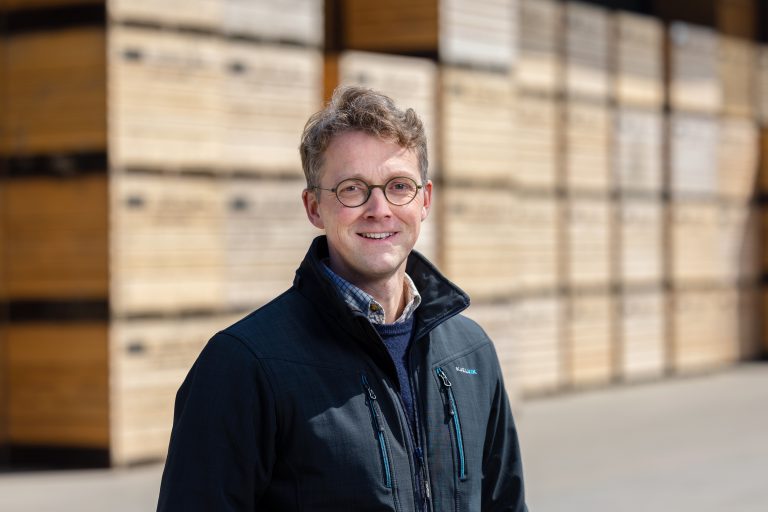Would you please briefly introduce yourself?
“My name is Arwin Bos. I’m married to Carola. Along with our three daughters, aged 8, 6 and 4 years old, we live in Nieuw-Vennep, in the polder of the Haarlemmermeer. There, we own an arable farm with a traditional farm plan. In our case, that means 130 hectares of land, on half of which we grow wheat, a quarter is for potatoes and another quarter for sugar beets.”
How far back does the company go, in your family?
“I’m the fourth generation here. My great grandfather – Grandpa Roos – started the farm in Nieuw-Vennep in 1914 as a tenant of the land, and was able to buy our second location in Zwanenburg during the crisis years of the thirties, through an auction. He had two kids. Tragically, his son died. His daughter married my grandfather, Willem Bos. Grandpa Bos was not the eldest son, however, so – as was customary for the time – he sought a daughter who owned a farm, in order to become a farmer there.”

Grandpa and Grandma Roos in front of the farm
Have you always dreamt of becoming a farmer?
“There were three of us, at home. My sister became an accountant and my brother an engineer. Neither of them had an interest in becoming a farmer. As for me, I decided to study law and business science and worked as a lawyer in Amsterdam for several years. But as I sat in my car in the mornings, and looked out over the tractors working in the fields, I had half a mind to turn back. When my father, Ad Bos, was approaching his retirement, I made the decision to follow my heart as an entrepreneur and farmer. And that’s how I became a full-time farmer in 2013. At first I wanted to try it for five years, to see how it would suit me. The fact that I’m still going should tell you enough.”

Ad Bos loading the potatoes
What were the defining moments for the company?
“As a company, we’re not known for huge strides. In terms of acreage, we’ve been quite stable for over a hundred years. That’s because of the spatial pressure in the Haarlemmermeer. Because there’s little room, the emphasis has always been on improving the facilities and machines. When I started farming, we founded ‘de Aardappelboer’ (the Potato Farmer). With that enterprise, we can sell potatoes directly to the end consumer, mainly restaurants and caterers, and shorten the supply chain. In a manner of speaking, it allows me to do on my own what Cosun does as a cooperative: extracting value from the supply chain in order to benefit the farm. As an individual farmer, that’s easier to do with potatoes than with sugar beets, the processing of which has to happen centrally. Doing business this way is great fun; it’s an important branch of our company. The sugar beets provide stability in the farm plan and business operations.”
What side activities do you have, on the property or beyond it?
“Since 2023 I’m chairman of the Board of Directors at Cosun. That’s about 4-5 days of work per week. That’s been quite a change. I do it out of a sense of commitment, but also because I enjoy it; to bring the cooperation further and to ensure the preservation of the farmer identity. Because Cosun is growing and doing quite well in certain areas. But you do want it to retain its DNA as a farmers’ club. I see that as part of my duties. And I gladly devote time to that. That means you have to run your company in a way that that’s possible. This is why we employ two permanent employees on the farm, and since I took office as chairman, my wife is a full-time partner of the company as well. So at the moment, I’m more of a weekend farmer. Although I hope there will be a time I can spend more time on the farm again.”
What’s your connection to the cooperation?
“My great grandfather already supplied beets to Cosun’s predecessor. By now, the cooperation has existed for 125 years, of course. That’s why I always say we see Cosun as extension of our family farm.”

